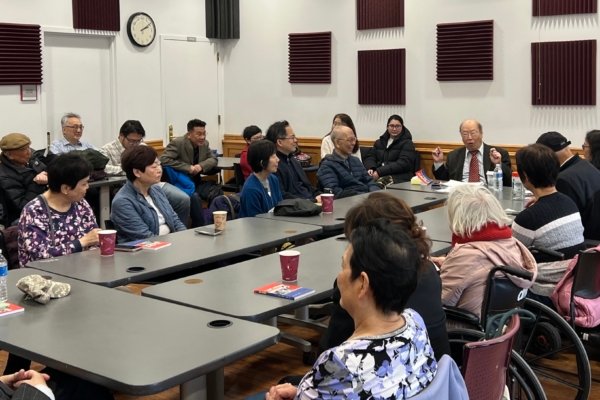In pursuit of the “American Dream,” illegal immigration has become an irresistible choice for many. However, the journey of illegal immigration is fraught with risks – some unfortunate individuals lose their lives at sea, while others are fortunate enough to receive “amnesty” and obtain legal status, even achieving great success. Yet, there are those who spend years in hiding in a foreign land, struggling to survive. One underage illegal immigrant, with the help of policies, quickly gained release, received an education in the United States, and ultimately changed his fate.
“The Rusty American Dream” is a documentary work that records the wave of Fujianese immigrants and the shocking Ping sister case. On March 25th, the co-authors of the book held a unique interview event at the Chinatown library in response to an invitation, sharing the creative process and background stories behind “The Rusty American Dream” with the audience.
The venue for the Tuesday interview was packed, with every individual carefully listening to the real-life stories described in the book. Many had heard of or knew the individuals involved in the events that took place decades ago, including descendants of Ping sister, who still operate businesses in Chinatown.
One young man, going by the pseudonym “Lin Anshun,” embarked on a perilous journey to the United States in 1993, leaving a lasting impression with his journey and final outcome.
In May 1991, Lin Anshun set off from Meihua Town, Changle, Fujian, and under the arrangement of snakeheads, traveled to Thailand, Singapore, South Africa, crossed the Atlantic Ocean, and finally boarded the “Golden Adventure” carrying over 300 illegal immigrants, arriving off the coast of Boston in May 1993. However, on May 24th of the same year, internal conflicts within the Fushi gang responsible for assisting the migrants in disembarking led to chaos, resulting in no reception for the migrants. The vessel eventually arrived on Long Island, New York, returned to Boston in June, and ran aground at Rockaway Beach in Queens, New York, causing international uproar.
In the end, 256 illegal immigrants were officially registered as having landed, with 10 bodies recovered, and several others remaining unregistered, including unidentified deceased who either escaped on the spot or were washed away by the sea.
Reflecting on the events, Yu Jinshan, who served as Lin Anshun’s translator at the time, recalled how his aunt in New York, upon learning of the news, prayed for his safety at the church daily and later found her nephew in an immigrant detention center due to his being under 18 years old, leading to his release.
Following his release, Lin Anshun completed a high school equivalent education in the United States, faced challenges to enter university, eventually becoming a social worker, marrying his girlfriend from Hong Kong, and starting a family, becoming one of the fortunate cases among the “Golden Adventure” migrants.
Yu Jinshan pointed out that there are many such immigrants whose descendants have excelled in special high schools and prestigious universities, contributing to the United States. “Despite being seen as illegal immigrants on the surface, their drive, abilities, wisdom, and innovative spirit propel America forward.”
Published in 2006, “The Rusty American Dream” describes the wave of illegal immigration by Fujianese Chinese immigrants 30 years ago, depicting the reality of the East Broadway community in Chinatown at that time. The book also extensively covers the tumultuous life of a person known as “Ping sister,” particularly her role during the Fujianese migration wave.
The authors of the book personally visited Ping’s hometown for interviews, receiving feedback from villagers that she helped those in the village without job prospects “enter America,” and that “she had always been conscientious. If an illegal immigrant tragically perished or died for other reasons during the journey, she would personally bring cash to the deceased’s family to offer condolences and compensation.” Consequently, even after Ping sister was sentenced, she continued to garner unanimous support from her hometown, and following her passing, the Minnanese community in Chinatown still paid their respects during her funeral, showing their gratitude.
To the United States, Ping sister was the “Queen of Illegal Immigration” who violated American laws. However, to many Chinese individuals, her story represents a different narrative – “She helped many Fujianese come to America, especially those who had no hope of turning their lives around back in their hometowns, giving them the opportunity to change their destinies.”
Another author of the book, Chen Jianqin, was also present at the event, reminiscing about the gang massacres and extortion cases they reported and interviewed alongside Yu Jinshan.
With over 30 years of journalistic experience, Yu Jinshan has authored works such as “Complete Guide to American Immigration,” serving as chairman of the New York Chinese Consolidated Benevolent Association twice, and is currently the leader of District 65D in the New York City Democratic Party.
“We cannot overlook the contributions of immigrants to the United States; immigrants are significant contributors to America,” Yu Jinshan emphasized. “Of course, immigration must be regulated; the United States needs a standardized immigration policy to prevent tragedies from reoccurring, strengthen border management, and support legal immigration procedures.”

